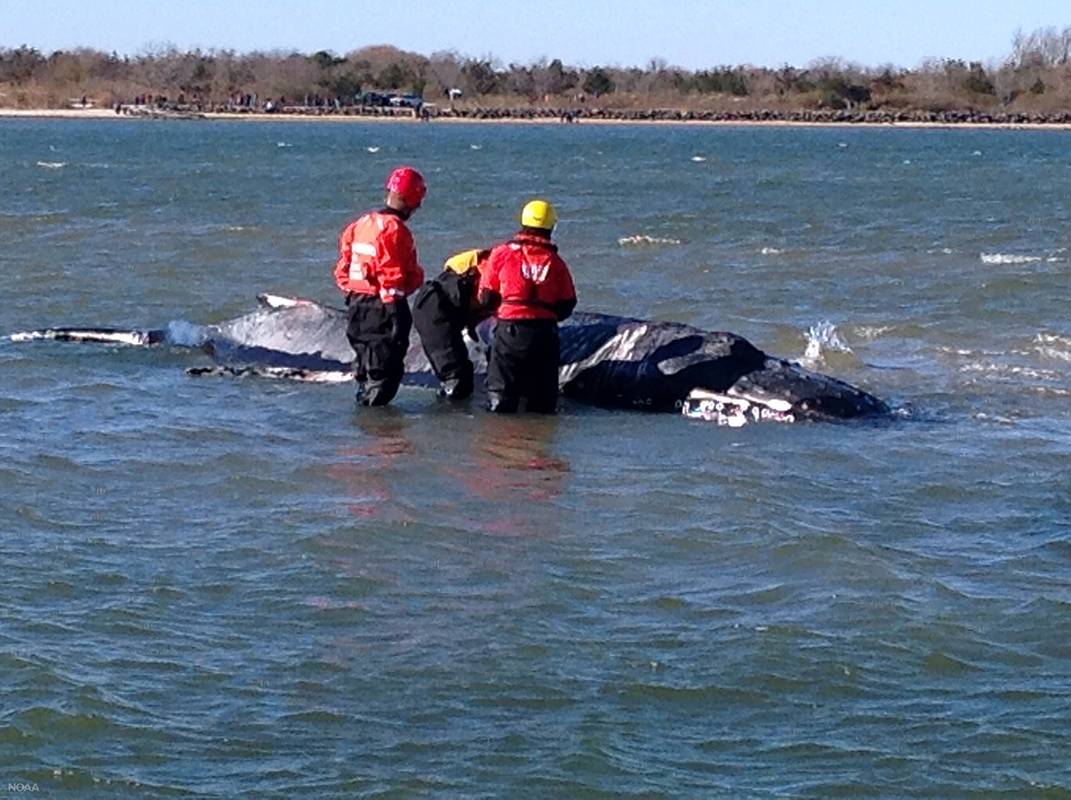
Stranded Whale Euthanized in Long Island Bay

A humpback whale that stranded on a sandbar in Moriches Bay in Long Island, New York, on Nov. 20 was euthanized on Wednesday (Nov. 23), after attempts to move the animal into deeper waters were unsuccessful.
Marine biologists and veterinarians evaluated the whale's condition and determined that the animal was too badly injured to survive.
"It was thin, limp, weak, minimally responsive, [and] had evidence of neurological abnormalities and extensive skin injuries with evidence of infection," the team said in a statement released Nov. 23. The team included individuals from the National Oceanic and Atmospheric Administration (NOAA), the Riverhead Foundation for Marine Research and Preservation (RFMRP), the International Fund for Animal Welfare, and North Carolina State University.
Related: Big Miracle: The Real Rescue in Images
"Based upon these findings, the most humane option was to euthanize the whale since its chance of surviving in the wild was minimal," the experts added.
Reports of a whale swimming in Moriches Bay first surfaced on Nov. 13, the RFMRP shared on Facebook. The group explained that the whale, which appeared to be a young humpback, was probably feeding, and the RFMRP advised boaters to keep their distance.
However, on Nov. 20, the whale became grounded on a sandbar in Hart's Cove in very shallow water — about 1 to 2 feet (0.3 to 0.6 meters) deep, according to NOAA.
Sign up for the Live Science daily newsletter now
Get the world’s most fascinating discoveries delivered straight to your inbox.
RFMRP biologists, who respond to whale strandings under NOAA's guidance, attempted to dislodge the animal from the sandbar by using boats to create wave action that would lift the whale free. However, the waters were too shallow. Even after several tide cycles raised the water level around the whale, the animal remained stuck.
The team evaluated several other options for freeing the whale, but the possibility of causing great harm to the animal in the process was simply too high, the RFMRP said on Facebook. The decision to euthanize the whale, which involved an injection, was the only remaining option, said John Bullard, director of NOAA's Greater Atlantic Regional Fisheries Office.
"The tidal conditions and other oceanic or biological factors that led to this stranding overtook any ability by our responders to rescue it," Bullard said in a statement. "We are thankful to our partners and the community for their caring response and respect for law enforcement as we pursue this humane option."
A necropsy will be performed on the whale after it is transferred to a safe location. The procedure will help scientists determine whether health issues caused the animal to strand in the first place.
Original article on Live Science.

Mindy Weisberger is an editor at Scholastic and a former Live Science channel editor and senior writer. She has reported on general science, covering climate change, paleontology, biology and space. Mindy studied film at Columbia University; prior to Live Science she produced, wrote and directed media for the American Museum of Natural History in New York City. Her videos about dinosaurs, astrophysics, biodiversity and evolution appear in museums and science centers worldwide, earning awards such as the CINE Golden Eagle and the Communicator Award of Excellence. Her writing has also appeared in Scientific American, The Washington Post and How It Works Magazine. Her book "Rise of the Zombie Bugs: The Surprising Science of Parasitic Mind Control" will be published in spring 2025 by Johns Hopkins University Press.









